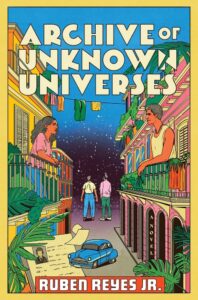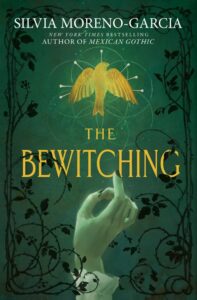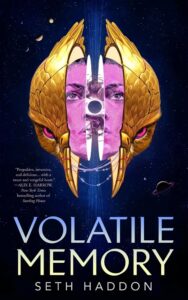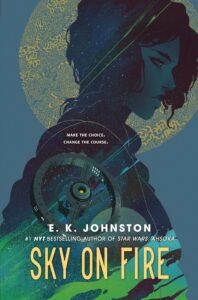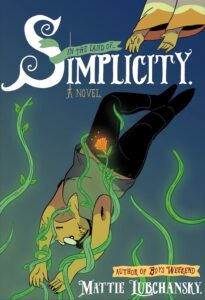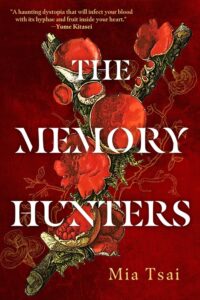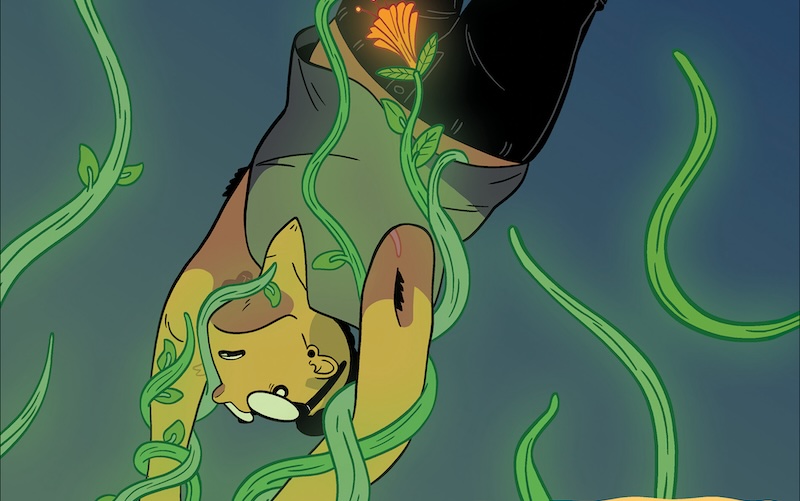
Defracted Universes, Memory Divers, and Darkest Academia: July’s Best Sci-Fi and Fantasy Books
Speculative Summer Reads From Silvia Moreno-Garcia, Mattie Lubchansky, Cassandra Khaw, and More
I’m compiling this month’s SFF list in the lead-up to the summer solstice; by the time you read it, the days will already have begun shortening, even incrementally. But summer has only just begun, and July brings a bevy of exciting reads for wherever the season takes you. Interestingly, two of the books on this list take place in the (semi) recent past, albeit alternate timelines: 2018 and 1998. But others leap ahead to 2081 or the twenty-third century. There are AI-aided multiverses and “sporror”—yep, spore-centric horror for those of you waiting on The Last of Us season 3. Witches, masks, cults, and gory necromantic school all play a part, as do two intriguing SF takes on climate change that are about the environment, of course, but more crucially about how our collective memory gets eroded and rebuilt.
*
Ruben Reyes Jr., Archive of Unknown Universes
(Mariner Books, July 1)
Following his speculative short fiction collection There Is a Rio Grande in Heaven, Ruben Reyes Jr.’s debut novel is historical fiction by way of the multiverse and artificial intelligence. A research student at Harvard in 2018, Ana regularly uses an experimental device called the Defractor to peek into AI-generated videos of alternate universes. The Defractor offers insights into both her flailing relationship with Luis as well as her academic research into the Salvadoran Civil War, but what she sees sends them to present-day Havana. A parallel timeline in 1978 traces the forbidden love between Luis’ grandfather Neto (a Salvadoran revolutionary) and his Nicaraguan boyfriend Rafael, both document forgers who write love letters across wartime. As the Defractor offers visions of two contradictory universes based on the war’s outcome, Ana and Luis wrestle with whether to change the past in favor of the present.
Wendy N. Wagner, Girl in the Creek
(Tor Nightfire, July 15)
Nightmare Magazine editor Wendy N. Wagner draws from several dark eras of Oregon’s history for her latest horror novel set near Mt. Hood: There’s the Pacific Northwest’s spate of serial killers in the 1980s, but there’s also a devastating fire near the Clackamas River in 2020. These landscape-altering events come together, threaded through with spore-centric horror akin to Jeff VanderMeer’s Southern Reach series, in a modern mystery centering on Erin’s missing brother Bryan. When Erin ventures out to the foothills of Mt. Hood, she discovers the body of a missing woman, from which strange growths sprout—claimed by the Strangeness, though no humans know that yet.
Silvia Moreno-Garcia, The Bewitching
(Del Rey, July 15)
This multigenerational gothic horror spans the entire 20th century, tracing three women’s differing interactions with witchcraft. When Nana Alba was a child in 1900, witches were still around, as in the stories she tells her great-granddaughter Minerva. By the time Minerva is a graduate student researching horror literature in the 1990s, she thinks these are merely stories. But when her studies into obscure author Beatrice Tremblay reveal supernatural happenings during Tremblay’s own time at the same university, Minerva must confront a new theory, that witches never disappeared and are still practicing their dark magic today.
Seth Haddon, Volatile Memory
(Tordotcom Publishing, July 22)
In Seth Haddon’s sci-fi novella, humans roam across the galaxy wearing AI HUD masks fashioned to resemble animals, whose personas they can’t help but take on. To wit, scavenger Wylla is used to being the twitchy and vulnerable RABBIT, even if her mask is malfunctioning. When she gets a tip about a mask upgrade that’s free for the taking, she doesn’t expect to find another soul inside the HAWK: Sable, the consciousness belonging to the cooling corpse attached to said mask. When Wylla dons the HAWK, she transforms from prey to predator, but she also finds a kindred spirit in Sable, who—unlike the commercial interests ruling the space between the stars—doesn’t think Wylla is somehow less for being trans.
E.K. Johnston, Sky on Fire
(Dutton Books for Young Readers, July 22)
I’ve been a fan of E.K. Johnston since her Star Wars YA novels filled in some of the narrative blanks about Padmé and her handmaidens. What’s more, her Aetherbound novels are space fantasy drawing inspiration from Arthuriana, so another adventure from that universe sounds like an excellent summer read. Unlike the aetherworkers or mage-scientists who power the Stavenger Empire, grad student Morgan Enni has an affinity only for science and not for magic. Her empire-undermining fieldwork research is exactly what the burgeoning rebellion needs, but Morgan is guarding a family secret that may not allow her to fully align herself with their cause.
Cassandra Khaw, The Library at Hellebore
(Tor Nightfire, July 22)
Dark academia from Cassandra Khaw? Hell yes. And by dark, I mean oxblood—blood-drenched, nightmare death-magic school where competition is literally cutthroat and the faculty eat you at graduation (gulp). Alessa Li shouldn’t be surprised that she and her cohort at the Hellebore Technical Institute for the Gifted have been prepared as human sacrifices, considering that she was kidnapped in the first place. But Hellebore also supposedly offers redemption and a normal life post-grad… if she and her peers can survive the final initiation. The only way to do so? Ditch the dog-eat-dog mentality and figure out how to combine their apocalyptic gifts against a common enemy.
Mattie Lubchansky, Simplicity
(Pantheon, July 29)
Chances are you’ve seen cartoonist Mattie Lubchansky’s comics across the Internet, whether on The Nib, The Toast, or Gothamist (among others); their distinctive art style accompanies a speculative plot in their second graphic novel. Like Boys Weekend, it revolves around a cult; this one exists in 2081, a century after the fictional Spiritual Association of Peers retreats to the Catskills and cuts out the rest of the world. Anthropologist Lucius Pasternak is tasked with visiting Simplicity, as the compound is now called, and completing a survey for the mayor of what used to be New York City. But Lucius struggles to remain impartial in their study, drawn as they are both to Simplicity’s rituals and a particular acolyte, Amity Crown-Shy. When Lucius’ disturbing visions coincide with the grisly disappearances of several Simplicity members, Amity accompanies them to somewhere even more bizarre: the Exurb Zones, where preppers and isolationists fled generations ago.
Mia Tsai, The Memory Hunters
(Erewhon Books, July 29)
Inception meets Indiana Jones in Mia Tsai’s second novel: Archaeologist Kiana Strade can “dive” into people’s blood to recover the lost collective consciousness of what life was like before the Decade of Storms wiped everything out two centuries ago. Diving is a consecrated art, but Key struggles with her competing desire to contribute her research to the Museum of Human Memory instead of the temple in which she was raised. Guarded by the loyal Valerian IV, Key discovers a memory that contradicts the history upon which their society was built—and to her and Vale’s horror, she dives so deep that she begins drowning in others’ memories, losing more and more of herself. No inception necessary, I’m psyched about this one.
Natalie Zutter
Natalie Zutter is a Brooklyn-based playwright and pop culture critic whose work has appeared on Tor.com, NPR Books, Den of Geek, and elsewhere. Find her on Twitter @nataliezutter.









